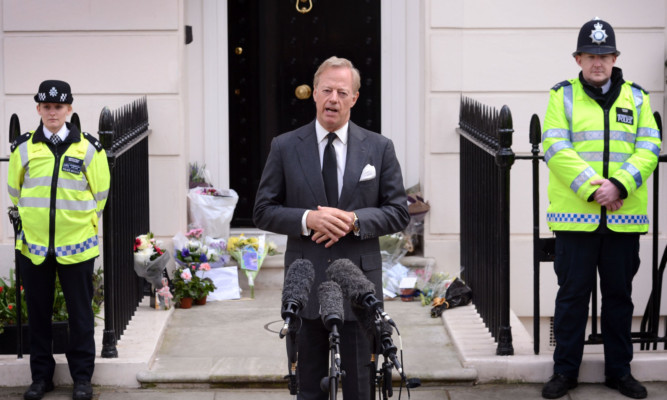More than 700 armed forces personnel will take part in the funeral of Baroness Thatcher, it was announced as her son said she would have been “humbled” by the presence of the Queen at St Paul’s Cathedral.
Sir Mark Thatcher said the family had been “overwhelmed” by messages of condolence and support they had received since the death of the former prime minister was announced on Monday.
In the Commons, recalled in special session to mark her death, David Cameron led the tributes from MPs to “an extraordinary leader and an extraordinary woman”.
But with many Labour MPs choosing to stay away from Westminster, ministers defended the expenditure of public money on the funeral of a figure who remains so controversial.
Downing Street confirmed that there would be a contribution made from Lady Thatcher’s estate but said the cost to the taxpayer would not be disclosed until after the service next Wednesday had taken place.
The scale of the ceremonial funeral became clear as Downing Street said that the streets of central London would be lined by men and women from all three services for the procession to St Paul’s.
Three military bands will play, their drums draped in black, while processional minute guns will be fired from Tower Wharf at Tower Bridge.
The coffin will be carried into the cathedral by bearers drawn from ships, squadrons and regiments particularly associated with the Falklands War.
Sir Mark, in his first public comments since his mother’s death, said the family was grateful and honoured that the Queen had agreed to attend the funeral.
“I know my mother would be greatly honoured as well as humbled by her presence,” he said.
“We have quite simply been overwhelmed by messages of support, condolence of every type from far and wide, and I know that my mother would be pleased they have come from people of all walks of life.”
In the Commons, Mr Cameron said it would be a “fitting salute to a great prime minister”.
He added: “She made the political weather, she made history and, let this be her epitaph, she made our country great again.”
Mr Cameron also paid tribute to the “generosity of spirit” of political opponents who had still turned out at Westminster to pay tribute to her. Nevertheless, there were large gaps on the Labour benches, with many of the party’s MPs preferring to remain in their constituencies.
Among those who did attend, Labour former minister Michael Meacher said “scorched earth” tactics had “polarised” the nation.
“Too many industries, too many working class communities across the North were laid waste during those years without any alternative and better future to replace what had been lost,” he said.
Veteran Labour MP David Winnick said it would be “hypocritical” for critics of her policies at the time not to speak out now about the “immense pain and suffering” she caused to ordinary people.
“Even if one accepts that some of it was inevitable, what was so unfortunate was what I can only describe as the indifference and at times almost brutal contempt for those who lost their jobs,” he said.
In contrast, former prime ministers Tony Blair and Gordon Brown both announced that they would be among the mourners at St Paul’s.
In the Commons, Labour leader Ed Miliband said that Lady Thatcher had “defined the politics of a generation”, adding: “Whatever your view of her, Margaret Thatcher was a unique and towering figure.”
But while he said the former prime minister had been right to recognise the need for economic change, he said she had been wrong in her treatment of the miners, gays and lesbians, and Nelson Mandela.
No 10 strongly defended Mr Cameron’s decision to request the recall parliament.
“Given her stature and importance, the prime minister thought that the right thing to do was to ask the Speaker to recall parliament,” an official spokesman said.
Earlier Foreign Secretary William Hague dismissed suggestions that tax-payers should not be involved in footing the bill for the funeral.
“When it comes to money, the rebate she negotiated for this country from the EU has brought us so far £75 billion, which is twice the size of our annual defence budget,” he said. “I think that puts money in perspective… so I think we can afford to contribute to a funeral.”
